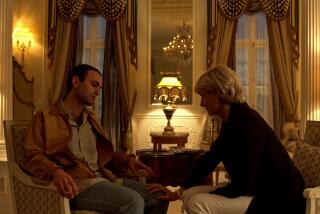Little Book Lost : NONFICTION : LITTLE GIRL LOST: The Troubled Childhood of Princess Diana by the Woman Who Raised Her, <i> By Mary Clarke (Birch Lane Press: $19.95; 256 pp.)</i>
- Share via
What could former nanny Mary Clarke possibly have been thinking of, besides cash, when she wrote the tedious and unenlightening “Little Girl Lost: The Troubled Childhood of Princess Diana by the Woman Who Raised Her”? By no stretch of the imagination was the author, who fancies herself in the Maria von Trapp role in “The Sound of Music,” a formative influence. In 1971, when Clarke was barely 21, she was hired by Diana’s divorced father, then Lord Althorp (later the Earl of Spencer), to look after his 6-year-old heir, Charles, and 9-year-old Diana for 19 months, until Charles was old enough to leave for boarding school. Diana was already away at Riddlesworth, a boarding school, and the author was responsible for her only during school holidays, half of which Diana spent with her mother.
Maybe Clarke hasn’t read the subtitle of her own book, for she states: “Diana had a happy secure childhood. From the moment I met her and worked with the family, I saw she was helpful, laughing, exuberant, loved by both her parents, and the apple of her father’s eye.”
Clarke reveals that Diana dared her sister Sarah to ride her horse, Peppermint, into Park House, the 10-bedroom 19th century mansion built by Edward VII where she grew up. Diana and her brother got tangled up when they were practicing for a three-legged race, and--be still my heart--Diana went to bed at 8 p.m., though she was allowed to keep her light on for an extra half-hour.
Under the right circumstances, such homespun memories might be charming. In 1950, Marion Crawford, governess to the young Queen Elizabeth and Princess Margaret, published “The Little Princesses,” a benign memoir of her life at court. “Crawfie,” as she was known in royal circles until the Windsors cut her dead for writing the book (henceforth all employees had to sign a “Crawfie clause” prohibiting them from doing the same), had the good fortune to have cared for Elizabeth from age 5 until her marriage, a span that covered the abdication and World War II.
But in Clarke’s book, instead of historical figures like Wallis Simpson and Queen Mary, we get Peanuts, Diana’s guinea pig, and Romany, the pony. The only remotely interesting event described is a custody hearing in which Clarke was called as a major witness. (The author’s biography actually reads, “Mary Clarke, criticized by Diana’s mother. . . .”) But all she remembers is that her testimony saved the day.
Eager to prove her self-importance, the author goes on to analyze the failed royal marriage (it was all his fault), and Diana’s recent TV interview (she’d have advised against it). Save your money for the guinea pig’s tell-all.
More to Read
Sign up for our Book Club newsletter
Get the latest news, events and more from the Los Angeles Times Book Club, and help us get L.A. reading and talking.
You may occasionally receive promotional content from the Los Angeles Times.







